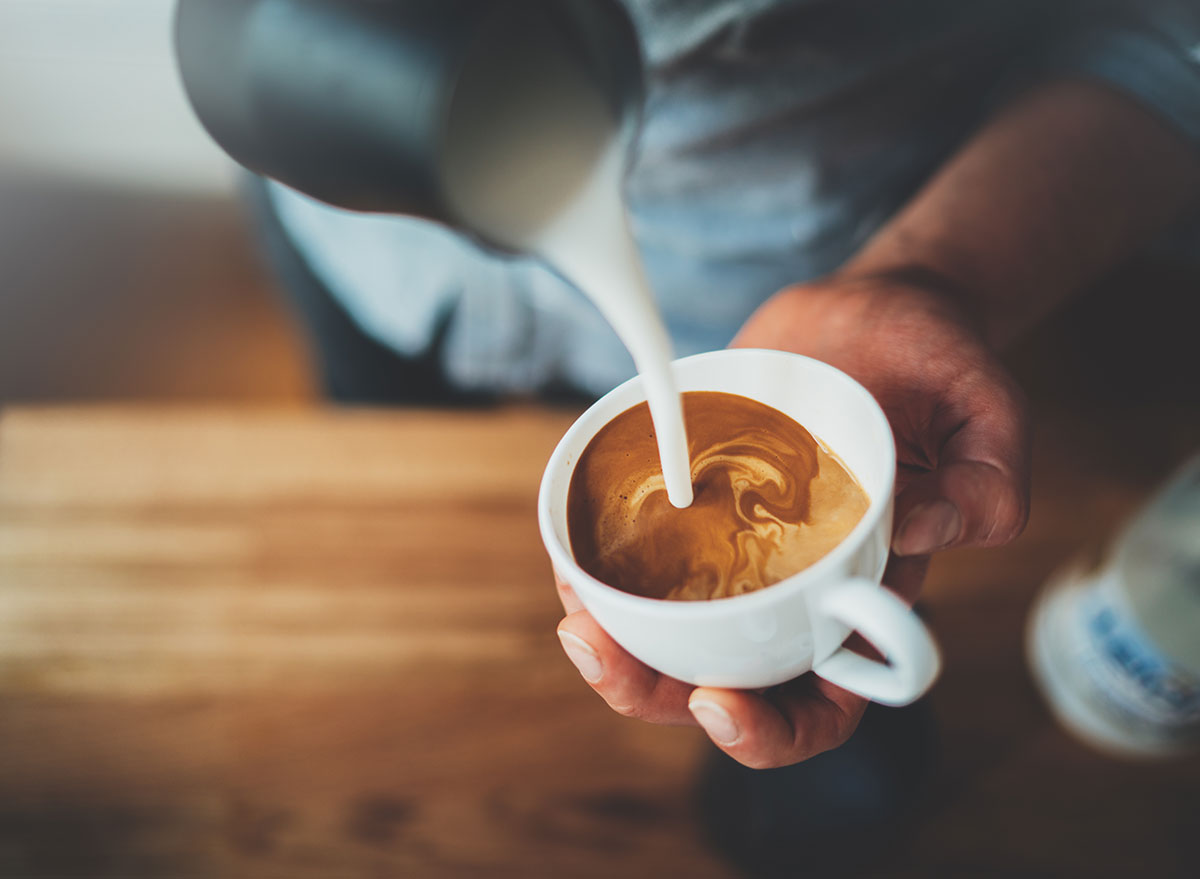Ways Drinking Coffee Backfires, Say Experts

First, let’s be clear about something. Having a cup of coffee in the morning can actually be good for you. In fact, the boost in caffeine and the antioxidants in coffee benefit your body in all sorts of ways including strengthening your immune system, getting your brain going, and of course, gives you that energy boost to start your day. However, while drinking it black is truly the healthiest way to drink coffee, it’s not always the tastiest for coffee lovers. And if you’re not careful, those added ingredients can backfire on your overall health if you’re not careful.
If you’re curious about the ways your cup of coffee is backfiring on you in the morning, we spoke with a few experts on what to look for and how to avoid it. Here are the tips they shared with us, and for even more healthy tips, be sure to check out our list of The 7 Healthiest Foods to Eat Right Now.
Loading it with added sugars causes weight gain.

“Coffee beans amp up your intake of a variety of plant compounds and antioxidants. However, loading it up with sugary syrups, toppings and whips can add unwanted calories,” says Amy Goodson, MS, RD, CSSD, LD, author of The Sports Nutrition Playbook. “Before you know it, your favorite coffee drink becomes a meal! To enjoy your cup of joe and watch your sugar intake, try adding creamy low-fat milk (adds protein and nutrients) and a little sweetener of your choice. The key is not going overboard.”
Here are 14 Sneaky Sources of Added Sugars that may also be lurking in your diet.
Drinking too much of it can cause reflux.

“It’s actually very individual how people react to coffee and there are two issues involved that can backfire on you. One is caffeine and the other is acidity,” says Jamie Feit, MS, RD and expert at Testing.com. “Coffee is very acidic and can aggravate reflux. Caffeine is not bad for you unless it keeps you up at night. So if you are drinking so much coffee that you cannot get a good night’s sleep then you may want to rethink your morning cup.”
Caffeinated beverages—like coffee, soda, and tea—are all known to be reflux triggers, especially for those who struggle with gastroesophageal reflux disease.
Get even more healthy tips straight to your inbox by signing up for our newsletter.
Coffee creamer can increase saturated fat intake.

“Coffee can be a great way to kick start your day, give you energy, and make you feel like you can take on the world, but there are some risks that can come along with coffee drink and cause your daily cup of coffee to backfire,” says Ricci-Lee Holtz, RD and expert at Testing.com. “One thing to be cautious of is to make sure you aren’t drinking coffee with your creamer and sugar, but creamer and sugar with your coffee in order to avoid incorporating high levels of unwanted saturated fat and quick sugar into our diet that can be equivalent to eating desserts if overdone.”
According to the American Heart Association, only 5% to 6% of your daily calories should come from saturated fat. For a person that eats a 2,000 calorie diet, that should only be around 13 grams of saturated fat in a day. An average coffee creamer can have around 1 to 2 grams of saturated fat per 1 serving (usually around 1 or 2 tablespoons), and adding heavy cream to your coffee will increase the saturated fat up to 3 grams per 1 tablespoon.
Processed sugar and artificial ingredients cause health issues.

“Coffee in itself is not unhealthy, it’s what you add to your coffee that becomes the problem,” says Megan Byrd, RD at The Oregon Dietitian. “Adding processed creamers and tons of sugars is pretty common, but really unhealthy. Too much processed sugar and artificial ingredients can wreak havoc on our health, including gut health, our metabolisms, and heart health. You should definitely limit the number of sweetened creamers and sugars you add to your coffee. You can do so by finding other ways to flavor it, such as buying flavored coffee beans or making protein coffee with protein powder and a shaker bottle.”
Instead, why not snag one of these 12 Healthy New Coffee Creamers on Shelves This Year?
Too much caffeine can cause adverse side effects.

“Coffee comprises caffeine that can cause insomnia, anxiety, agitation, stomach ache, nausea, or vomiting,” says Shannon Henry, RD at EZCare Clinic. “It can also cause headaches, irregular heartbeat, and many other side effects.”
It’s important to limit your caffeine intake each day to the allotted 400-milligram limit, which equates to around four 8 oz. cups of coffee. If you end up drinking more than that in a day, here are the Ugly Side Effects of Drinking Too Much Coffee, According to Science.








